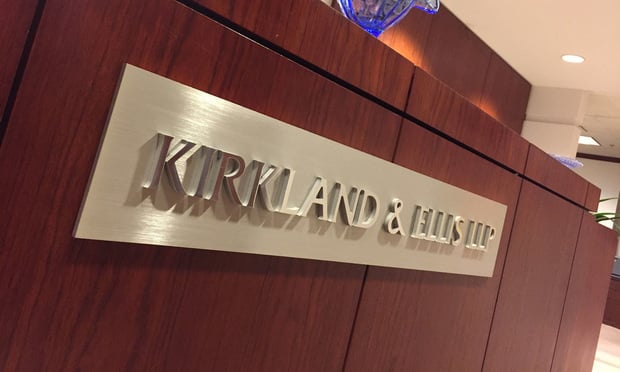Kirkland's Role Advising 'Repeat Players' Highlights Risk of Business Conflicts in Deals
"It's not surprising to me at all that Kirkland has had to confront this," said one corporate law professor. "But usually they spot it early in the process."
June 11, 2020 at 03:49 PM
6 minute read
 Photo: Diego Radzinschi/ALM
Photo: Diego Radzinschi/ALM
Kirkland & Ellis' resignation from a large debt deal involving multiple firm clients offers a conflicts lesson for firms seeking to rapidly expand client connections in finance and private equity deals.
"This is a real problem in the transactions finance space where there are repeat players and you have ties to each of them," said Eric Talley, a corporate law and finance professor at Columbia Law School and co-director of the Millstein Center for Global Markets and Corporate Ownership.
Business conflicts can be difficult to identify at the beginning of a deal, experts said, putting law firms in a tough position later on in an acrimonious transaction.
Kirkland & Ellis, a dominant force in the deal space, was representing U.K.-based corporate travel company Travelport Worldwide in a $1 billion financing deal. The firm backed out of its advisory role to the company after debt investors that Kirkland also represents got into a legal tangle over the deal, according to a Thursday report in The Wall Street Journal.
Elliott Management Corp. and private equity firm Siris Capital Group, which collectively made a $2 billion investment in Travelport Worldwide last year, planned on shoring up their investment during the pandemic with an additional $1 billion in debt financing.
But the financing was dependent on shifting some of the company's valued intellectual property assets away from its current lenders, which include Blackstone Group and Bain Capital, both of which Kirkland has represented in other matters.
The deal allowed those IP assets from Travelport to be put out of reach of previous investors and used as collateral for the investment from Elliott and Siris. This maneuver has been used before by Kirkland private equity clients, the WSJ reported, as fewer and fewer restrictions have been put on debt agreements in recent years.
Akin Gump Strauss Hauer & Feld is now representing Blackstone and Bain, among others, in legal action that accuses Travelport of violating the terms of its $2.9 billion first-lien loan and defaulting on its debt, according to the Journal.
Representatives from Kirkland said the firm had no comment on the matter.
It stands to reason, Talley said, that as big firms expand their private equity and finance practices and represent more and more entities in the space, they will invariably find conflicts.
"It's not surprising to me at all that Kirkland has had to confront this," he said. "But usually they spot it early in the process."
Indeed, it isn't uncommon for firms to negotiate against investors they represent in other matters. It is less common, however, that the advising firm would end up having to back out of its advisory role when the deal becomes too contentious, Talley said.
"This is not a conflict under the professional rules of conflict," said Stephen Gillers, a legal ethics professor at New York University School of Law. "This is a business conflict, which can be harder for firms to identify at the onset of a deal."
Gillers said that while ethical conflicts during deals do occasionally rise, firms have traditionally been able to identify them early in the process by simply doing database searches on companies and their subsidiaries. They can then choose not to accept the work.
But business conflicts are harder, and Gillers said that those conflicts are top of mind at the firms he has worked with. "When I talk to law firms about conflicts, the issue of business conflicts often arises," he said. "Law firms are more concerned about business conflicts than ethical conflicts. Not because they are unethical, but because they are able to anticipate ethical conflicts. The can't as easily identify the business conflicts."
The type of maneuvers at play in the Travelport deal didn't happen overnight. Talley said that about 15 years ago, corporate debt contracts that had very light covenants on borrowing restrictions started to take hold. After the financial crisis of 2008-2009, which Talley said was somewhat aided by these slack borrowing regulations, those covenants were tightened up.
But, as time passed and markets and deals rebounded, the light touch returned. Lenders, eager to get what returns they could front the corporate debt market, accepted fewer and fewer protections when investing, setting up the scenario above.
"It has value to the borrower," Talley said of the loose contracts. "They can basically say I am going to drop these assets into a subsidiary and borrow again against it. If you are someone who already lent money to the borrower, you feel like you have been pushed to the back of the line."
Due to the mostly shrouded nature of private deals, it isn't always publicized when conflicts among legal counsel arise amid these contentions dynamics.
"It takes a legal fight for this to get into the papers," Talley said. "That said, in order to handle these potential conflict areas and assess whether those are manageable, you have to monitor all things coming in, and that gets more complicated when you grow large as a firm and have teams that overlap each other."
Gillers said the best way for firms to avoid those conflicts is simply to turn down business that could cause a problem. But, again, it isn't always possible to do so.
"When a law firm is retained and then sometime later it confronts a business conflict where multiple clients are unhappy with the law firm's work, even though that work is ethical, the firm needs to decide who it wants to antagonize the least," Gillers said.
Read More:
Wachtell Leads the Pack in Global M&A Value as Kirkland Keeps Its Volume Edge
Kirkland's Reign Continues as Firm Hits $4 Billion in Revenue
This content has been archived. It is available through our partners, LexisNexis® and Bloomberg Law.
To view this content, please continue to their sites.
Not a Lexis Subscriber?
Subscribe Now
Not a Bloomberg Law Subscriber?
Subscribe Now
NOT FOR REPRINT
© 2025 ALM Global, LLC, All Rights Reserved. Request academic re-use from www.copyright.com. All other uses, submit a request to [email protected]. For more information visit Asset & Logo Licensing.
You Might Like
View All
Paul Hastings, Recruiting From Davis Polk, Adds Capital Markets Attorney
3 minute read
Kirkland Is Entering a New Market. Will Its Rates Get a Warm Welcome?
5 minute read

Goodwin Procter Relocates to Renewable-Powered Office in San Francisco’s Financial District
Law Firms Mentioned
Trending Stories
- 1The Law Firm Disrupted: For Office Policies, Big Law Has Its Ear to the Market, Not to Trump
- 2FTC Finalizes Child Online Privacy Rule Updates, But Ferguson Eyes Further Changes
- 3Chief Judge Joins Panel Exploring Causes for Public's Eroding Faith in NY Legal System
- 4Pogo Stick Maker Wants Financing Company to Pay $20M After Bailing Out Client
- 5Goldman Sachs Secures Dismissal of Celebrity Manager's Lawsuit Over Failed Deal
Who Got The Work
J. Brugh Lower of Gibbons has entered an appearance for industrial equipment supplier Devco Corporation in a pending trademark infringement lawsuit. The suit, accusing the defendant of selling knock-off Graco products, was filed Dec. 18 in New Jersey District Court by Rivkin Radler on behalf of Graco Inc. and Graco Minnesota. The case, assigned to U.S. District Judge Zahid N. Quraishi, is 3:24-cv-11294, Graco Inc. et al v. Devco Corporation.
Who Got The Work
Rebecca Maller-Stein and Kent A. Yalowitz of Arnold & Porter Kaye Scholer have entered their appearances for Hanaco Venture Capital and its executives, Lior Prosor and David Frankel, in a pending securities lawsuit. The action, filed on Dec. 24 in New York Southern District Court by Zell, Aron & Co. on behalf of Goldeneye Advisors, accuses the defendants of negligently and fraudulently managing the plaintiff's $1 million investment. The case, assigned to U.S. District Judge Vernon S. Broderick, is 1:24-cv-09918, Goldeneye Advisors, LLC v. Hanaco Venture Capital, Ltd. et al.
Who Got The Work
Attorneys from A&O Shearman has stepped in as defense counsel for Toronto-Dominion Bank and other defendants in a pending securities class action. The suit, filed Dec. 11 in New York Southern District Court by Bleichmar Fonti & Auld, accuses the defendants of concealing the bank's 'pervasive' deficiencies in regards to its compliance with the Bank Secrecy Act and the quality of its anti-money laundering controls. The case, assigned to U.S. District Judge Arun Subramanian, is 1:24-cv-09445, Gonzalez v. The Toronto-Dominion Bank et al.
Who Got The Work
Crown Castle International, a Pennsylvania company providing shared communications infrastructure, has turned to Luke D. Wolf of Gordon Rees Scully Mansukhani to fend off a pending breach-of-contract lawsuit. The court action, filed Nov. 25 in Michigan Eastern District Court by Hooper Hathaway PC on behalf of The Town Residences LLC, accuses Crown Castle of failing to transfer approximately $30,000 in utility payments from T-Mobile in breach of a roof-top lease and assignment agreement. The case, assigned to U.S. District Judge Susan K. Declercq, is 2:24-cv-13131, The Town Residences LLC v. T-Mobile US, Inc. et al.
Who Got The Work
Wilfred P. Coronato and Daniel M. Schwartz of McCarter & English have stepped in as defense counsel to Electrolux Home Products Inc. in a pending product liability lawsuit. The court action, filed Nov. 26 in New York Eastern District Court by Poulos Lopiccolo PC and Nagel Rice LLP on behalf of David Stern, alleges that the defendant's refrigerators’ drawers and shelving repeatedly break and fall apart within months after purchase. The case, assigned to U.S. District Judge Joan M. Azrack, is 2:24-cv-08204, Stern v. Electrolux Home Products, Inc.
Featured Firms
Law Offices of Gary Martin Hays & Associates, P.C.
(470) 294-1674
Law Offices of Mark E. Salomone
(857) 444-6468
Smith & Hassler
(713) 739-1250










